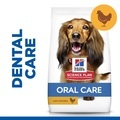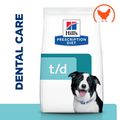Ensuring your dog’s teeth are kept clean and healthy is just as important as ensuring the health of our own. If the right care isn’t shown, plaque and tartar can build up on the teeth and around the gumline, irritating and inflaming the gums (known as gingivitis), and in turn leading to gum disease and even tooth loss.
As your dog ages, poor dental hygiene can become the root cause of many serious health issues, including bacterial infection which may spread to vital organs via the bloodstream.
Keeping the teeth maintained will not only help ensure a healthy pet; it will also ensure a healthy wallet by avoiding expensive vet bills.
So, if you’re wondering how you can support the health of your dog’s pearly whites, see our four tips below:
- Look for tell-tale signs – during your dog’s annual check-up, your vet will look for signs of tooth decay and yellow/brown tartar deposits around the gumline. They’ll also look for swollen and bleeding gums, bad breath and ask if your dog has had any difficulty eating. It is important to remember that bad breath can signal a variety of health issues, so don’t dismiss it as simply ‘doggy breath’ but get it investigated.
- Brush regularly – always use toothpastes that are specifically designed for dogs as human toothpastes will lead to an upset stomach. When it comes to the type of toothbrush to use, you might be able to get away with using a human toothbrush, depending on the size of your dog’s mouth. Alternatively, there are many dog-specific toothbrushes on the market, including ones that go on the end of your finger. If unsure, always ask your vet for advice.
- Establish a cleaning routine – this is best done when young so your dog gets used to it early. Always start with plenty of reassurance and go slowly to begin with. Try a small amount of toothpaste on the end of your finger and gently brush their teeth in a circular motion, getting them used to the sensation. Aim to do this at least once a week, if not every day. Your dog may not like it at first but try to be patient and eventually they’ll get the hang of it.
- Alternatives – if your dog won’t tolerate brushing, there are plenty of specially formulated alternatives out there, including foods and treats to help reduce tartar and prevent gum disease. This is the easiest way of ensuring your dog is getting at least some form of dental care each day. Our Vet Essential dry pet food helps deliver clinically proven cleaning action through its unique kibble technology, but you can always consult your vet to see if they have any recommendations of their own.
Keeping your dog's teeth clean and healthy isn't the simplest job in the world, but it will certainly benefit them now and far into the future, as well as potentially saving you a lot of money!
Written by: Hill's (Guest Author)


